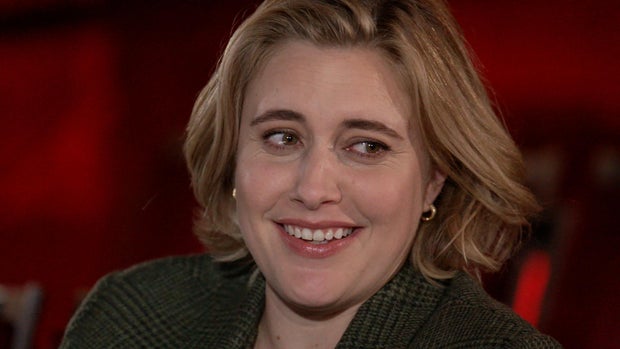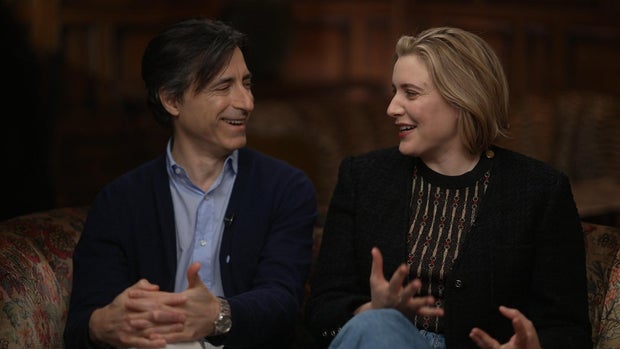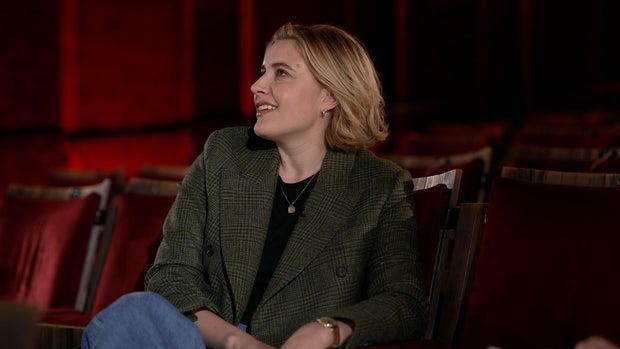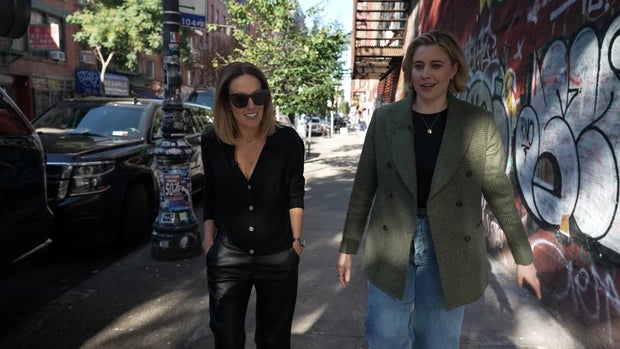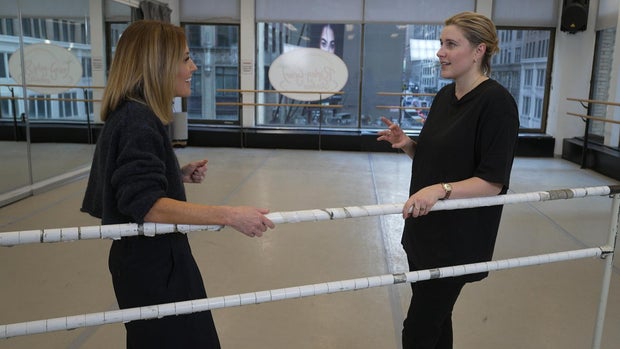This is an updated version of a story first published on Dec. 3, 2023. The original video can be viewed here.
For years, Hollywood has relied on towering action heroes to get people to the movies. But last summer, it was an 11 and a half inch doll…. complete with plastic accessories and a permanently-tanned sidekick that dominated the box office. “Barbie” brought in more than a billion dollars worldwide…the highest grossing movie of last year.
The brains behind the out of the box blockbuster is an equally unique filmmaker- Greta Gerwig. As we first told you last fall, Gerwig, is best known for her work as an actor, director and screenwriter on smaller, independent films.
Bankrolled by Warner Brothers and blessed by toy-maker Mattel, Greta Gerwig told us “Barbie” was a dream job…and one she feared just might end her career.
On a pastel colored soundstage, just outside of London, no one seemed to be having more fun on the set of “Barbie”… than director Greta Gerwig.
Gerwig has a way of making things look like child’s play but making “Barbie” – was not.
The film’s $100 million production budget was dwarfed only by the size of its marketing budget….a reported $150 million.
60 Minutes
Greta Gerwig: There is, like, a moment where you’re like, “Wow. I’m way out there. Like, if this doesn’t work, it will be a pub– (laugh) very public.”
Sharyn Alfonsi: People are gonna notice.
Greta Gerwig: “It would be an extremely public one. You know, you might as well take those big swings.” I mean, literally, the worst thing that can happen is it’s terrible, (laugh) nobody likes it and it bankrupts the studio –
Sharyn Alfonsi: That would be bad.
Greta Gerwig: Oh, no. Of course. Of course. But, like, how bad, you know? As bad as not making it, you know? Maybe, not.
Definitely, not.
“Barbie” smashed box office records to become Warner Brothers’ highest grossing film of all time.
It wasn’t a sure bet. Greta Gerwig, like Barbie’s permanently-arched feet – pulled off an almost impossible balancing act: giving voice to the iconic doll… and her fiercest critics.
Sharyn Alfonsi: You’re writing a movie for people that love Barbie. You’re writing a movie for people who, maybe, don’t love Barbie. It feels like a hornet’s nest.
Greta Gerwig: Yeah. There were lots of questions about, like, “Should we be saying this or walking into this stuff,” or– but my feeling was people already know it’s a hornet’s nest. We cannot make something that pretends to be other than that.
It was Barbie herself, actress Margot Robbie, who brought Gerwig into the fold.
Robbie bought the rights to make a Barbie movie and asked Gerwig to write it.
She agreed and signed up her partner in work and life, filmmaker Noah Baumbach but neglected to tell him. He learned about it from a headline.
Noah Baumbach: I think I said, “Apparently, (laugh) we’re writing a movie called Barbie.”
Greta Gerwig: Yeah. I said, “Ooh. Whoops.” (laugh)
Noah Baumbach: I couldn’t even fathom it. (laugh)
60 Minutes
Greta Gerwig: Well, I mean, his issue with it was that there was no character and there was no story.
Noah Baumbach: Well, I don’t– I didn’t mind that so much as that–
Greta Gerwig: You did.
Noah Baumbach: –you know, that it was Barbie.
Greta Gerwig: You told me, “There’s no character and there’s no story.” (laugh)
Sharyn Alfonsi: Wait. Isn’t Barbie a character?
Greta Gerwig: No.
Noah Baumbach: No. She–
Greta Gerwig: She doesn’t have, like, a personality– (laugh)
Noah Baumbach: It’s a doll. (laugh) And then when I found out we were doing it, sort of actively (laugh) tried to get us out of it. And then –
Sharyn Alfonsi: Did you actually try to get out of it?
Greta Gerwig: Yeah.
Noah Baumbach: I made -I made some calls. (laugh) And then –
Sharyn Alfonsi: It didn’t work? (laugh)
Noah Baumbach: No– because Greta was persistent and Greta saw something.
Greta Gerwig: I did.
Sharyn Alfonsi: Greta, what was it you saw?
Greta Gerwig: You know, Barbie’s been around since 1959, and everyone knows who she is, and everyone has an opinion, and she’s run the gamut of being ahead of time, behind time. She’s a hero, she’s a villain.
60 Minutes
Together they created their version of Barbie Land…a feminist utopia. Where every woman is Barbie…and every Ken- is just an accessory.
But an existential crisis in Barbie Land, sends Barbie and Ken into the real world.
Ken wanders off… discovers patriarchy– and likes it.
Sharyn Alfonsi: There were people that came out after the movie and said, “Oh. This movie is anti-man.”
Greta Gerwig: The movie is meant to be a big-hearted thing, even though it’s poking fun at everyone. But I had this– but this is– but I planned this in my head. I’ll just say it.
Noah Baumbach: OK.
Greta Gerwig: But I thought, “Well, this is not man-hating anymore than Aristophanes’s Lysistrata (laugh) was man-hating,” which is– does not sound like a sick burn when you say it out loud like that.
Sharyn Alfonsi: That’ll teach ’em.
Gerwig invoked a Greek playwright to defend barbie. We noticed her mind seems to percolate with literary references. Baumbach’s take on the “Barbie” backlash was simpler.
Noah Baumbach: I felt men could take it. I mean, t– come on. (laugh)
Greta Gerwig: I mean this sounds so silly to say out loud but I love ken. We love Ken. We also take Ken’s position quite seriously.
Noah Baumbach: Absolutely.
Greta Gerwig: I think, like, he has no identity outside of her.
Gerwig and Baumbach live in New York and wrote the screenplay at home during the pandemic.
Sharyn Alfonsi: Were you entertaining each other?
Greta Gerwig: Yes.
Noah Baumbach: Yeah. I mean, it kind of kept us sane.
Or the insanity went into the movie. They told us the final cut –which at times looks like a COVID fever dream– is very close to the script they submitted to Mattel. The toy maker- they say- was surprisingly hands off– but had notes.
Noah Baumbach: One of the notes was, “On page 112, does a Mattel executive have to be shot?”
Noah Baumbach: And I felt like that was exciting. We knew we were onto something.
Greta Gerwig: We felt like we might as well go for broke. They’re already not making movies.
Sharyn Alfonsi: You thought it might not ever get made? Yeah.
Greta Gerwig: Yeah. Oh, no. We thought it might never get made.
60 Minutes
And she says she never dreamed – she’d be the one who ended up directing it. Greta Gerwig grew up in Sacramento and fell in love with community theater in grade school. She took up dancing, then acting.
Sharyn Alfonsi: Did you know you would end up in New York?
Greta Gerwig: I–I wanted to be in New York but I just didn’t know that I– it was possible. I mean, it felt (noise) extremely far away and expensive.
She attended Barnard College, performed in school productions. then, fell in with a group of low-budget filmmakers – before setting her sights on a wider audience.
Greta Gerwig: I remember I walked into a casting director’s office. It was, sort of, the heyday of, like– just a certain look on network television, which I was never very good at doing. I don’t know why. But I was wearing overalls. And I remember they-
Sharyn Alfonsi: A bold choice. (laugh)
Greta Gerwig: She looked up and she goes, “You must be very talented.” (laughter)
She landed roles in more than a dozen movies. Some she helped write. Then, Greta Gerwig made the biggest leap of her career from indie darling…to breakout director with “Lady Bird.”
Gerwig wrote the coming-of-age story about the complicated relationship between a mother and daughter.
Sharyn Alfonsi: The scene where she jumps out of the car, (chuckle) what was your direction?
Greta Gerwig: I want you to, without even think about it, just– just hurl yourself out of this ca– like, I want it to be almost like you’ve acted before you’ve thought through completely what the result (chuckle) of this is gonna be.
Gerwig’s fearless approach…earned the then 34-year-old two Oscar nominations.
Two years later, she got a third nomination…for her 2019 adaptation of “Little Women.”
Then, came “Barbie”…with a budget more than ten times that of “Lady Bird.”
Last fall, at a theater in New York, Gerwig showed us some of the old musicals that inspired her…including 1957’s “Funny Face.”
Greta Gerwig: Look at the way they’re standing. That’s not humans Like, those are dancers. That’s what I wanted all the Barbies and Kens to look like.
“Barbie” has that technicolor soundstage look because Gerwig convinced the studio to build one, complete with a painted sky and backdrop to give the movie a 2D effect.
Greta Gerwig: Basically– the foreground is– that’s on a treadmill. So that’s going like this to create movement. And then the lines on the road are being pulled by a person behind it. And it’s about showing the work. I wanted to see that it was authentically artificial. Really fake. It’s about kids. It’s about playing with toys. The language of play has to be part of it.
Greta Gerwig: We shot this whole thing in one day.
Sharyn Alfonsi: No.
Greta Gerwig: Yeah. We shot it in one day. We had one day to get it. They were like, if you really want this dream ballet, you’re gonna get one day.
Sharyn Alfonsi: As you sit here in the theater today, it’s still amazing to you?
Greta Gerwig: Yeah. I mean, honestly, the whole movie, when I watch it, I– I still can’t believe anybody let me do this. (laugh)
Gerwig says they wrote the role of Ken specifically for Ryan Gosling.
Sharyn Alfonsi: Did you know him?
Both: No.
Greta Gerwig: I’d never met him.
Sharyn Alfonsi: I mean, you wrote his name, Ryan, in the script?
Greta Gerwig: Yes. It said, “Ken: Ryan Gosling.”
Noah Baumbach: It was his full name.
Greta Gerwig: Every other (overtalk) Yeah. We just put his full name in the whole time.
Noah Baumbach: It was a lot to type all the time. (laugh)
Sharyn Alfonsi: Did he instantly say, like, “Yes. I’m Ken”?
Greta Gerwig: I basically was like, “Listen. We’ve seen the future. You’re in it. And you’re Ken.” (laugh)
Hang around with Greta Gerwig long enough and a pattern emerges.
Greta Gerwig: Now you’re going to see how I get people to do things.
She has a way of coaxing people out of their comfort zones. At a dance studio in Midtown Manhattan…
Greta Gerwig: Why don’t you just come try it though. Just come try it.
60 Minutes
Gerwig directed me to join her as she got back into the swing of one of her first loves…tap dancing.
Greta Gerwig: This is actually a Proustian moment (laugh)
A Proustian moment…during something called a paradiddle. The only thing to do was step aside.
Sharyn Alfonsi: You’re a bit of a perfectionist?
Greta Gerwig: I guess so, yes.
Sharyn Alfonsi: But you’re, like, another take, another take, another take.
Greta Gerwig: Yeah. Yeah. Of course, yeah.
On the set of “Barbie,” Gerwig directed nearly 50 takes of this scene with America Ferrera…who plays a Mattel assistant and mother.
Soul-baring monologues, penned by Gerwig, are a staple of her films. The writer’s version of a guitar solo.
Noah Baumbach: Greta will go into some monologue mode, it’s kind of almost physical. Like, she goes in and she just like– and kind of like, (laugh) doing a thing and, like, you know, it’s like Joe Cocker or something. (laugh) it’s like -and then, she hands it over. And– and it’s great.
Next, Gerwig is taking on a big franchise. She’s directing and writing two “Chronicles of Narnia” movies. She confessed putting her stamp on the beloved C.S. Lewis classics is giving her nightmares.
Greta Gerwig: Yeah, whenever I’m stuck, I go for walks–
Sharyn Alfonsi: Do you get–
Greta Gerwig: –which is most of the time?
Sharyn Alfonsi: Do you get stuck?
Greta Gerwig: That’s all I’ve been–
Sharyn Alfonsi: I feel like its flowing out of you–
Greta Gerwig: That’s all I do. I only get stuck. That’s all I re– that’s why I’m always going on walks. (laugh)
Whatever she’s doing, it’s paying off. Greta Gerwig is the first woman to solo-direct a billion dollar movie…an idea that once seemed as far-fetched as Barbie in Birkenstocks.
Produced by Nathalie Sommer. Associate producer, Kaylee Tully. Broadcast associate, Erin DuCharme. Edited by Peter M. Berman.

